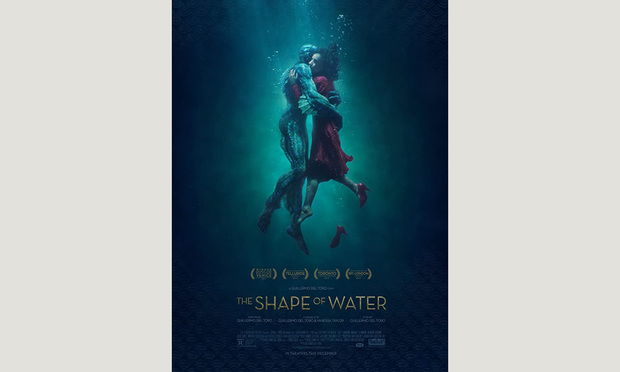9th Circuit Revives Copyright Suit Involving 'Shape of Water'
The ruling is a win for Alex Kozinski, the former chief judge of the Ninth Circuit who represents the son of Pulitzer Prize-winning author Paul Zindel in the case.
June 22, 2020 at 06:11 PM
3 minute read
 The Shape of Water movie poster. (Photo: Courtesy photo.)
The Shape of Water movie poster. (Photo: Courtesy photo.)
A federal appeals court has revived a copyright suit against the filmmakers behind the Academy Award-winning movie "The Shape of Water."
In an unpublished decision issued Monday, a three-judge panel of the U.S. Court of Appeals for the Ninth Circuit reversed a lower court win for studio Fox Searchlight and Macmillan Publishers, which published a novelization of the film, in a case brought by the son of Pulitzer Prize-winning author Paul Zindel, who claims that the film and the book infringe copyrighted elements of his father's play "Let Me Hear You Whisper."
The ruling is a win for Alex Kozinski, the former chief judge of the Ninth Circuit who represented the Zindel estate in the case.
"The decision was unanimous and clearly correct," Kozinski said in an email Monday. "We look forward to presenting our case to the jury, as happened in the LA Printex case, which the court cites. The jury in that case found infringement after the Ninth Circuit reversed the district judge's grant of summary judgment. I expect the same will happen in this case," Kozinksi said.
Oral argument in the case last year marked the first time that Kozinski appeared before the court since his abrupt 2017 retirement amid numerous allegations of harassment by clerks and, in one case, a former judicial colleague.
Monday's decision reverses U.S. District Judge Percy Anderson's dismissal of the case on a motion to dismiss. The Central District of California judge found no substantial similarity between Zindel's play, a work often performed in middle and high schools featuring a female janitor who plots to save a dolphin from a medical testing facility, and "The Shape of Water," where a female janitor aims to help an Amazonian river god she falls in love with escape from a military lab. Anderson made his decision by comparing the works, without taking any evidence or holding oral argument.
In Monday's ruling, the unanimous panel, Ninth Circuit Judges Kim Wardlaw and Kenneth Lee and U.S. District Judge Matthew Kennelly of the Northern District of Illinois, sitting by designation, found "at this stage, reasonable minds could differ" about whether the works were substantially similar.
"Though both works properly were presented to the district court, additional evidence, including expert testimony, would aid in the objective literary analysis needed to determine the extent and qualitative importance of the similarities that Zindel identified in the works' expressive elements, particularly the plausibly alleged shared plot sequence," the panel wrote.
Neither Jonathan Zavin of Loeb & Loeb, who represents the filmmakers, nor Davis Wright Tremaine's Kelli Sager, who represents Macmillan Publishers, responded to requests for comment Monday.
This content has been archived. It is available through our partners, LexisNexis® and Bloomberg Law.
To view this content, please continue to their sites.
Not a Lexis Subscriber?
Subscribe Now
Not a Bloomberg Law Subscriber?
Subscribe Now
NOT FOR REPRINT
© 2025 ALM Global, LLC, All Rights Reserved. Request academic re-use from www.copyright.com. All other uses, submit a request to [email protected]. For more information visit Asset & Logo Licensing.
You Might Like
View All
NBA Players Association Finds Its New GC in Warriors Front Office

Eagles or Chiefs? At These Law Firms, Super Bowl Sunday Gets Complicated
3 minute read
Blake Lively Is Sued by Texas Crisis Specialist in Latest 'It Ends With Us' Lawsuit
4 minute read
Chicago Law Requiring Women, Minority Ownership Stake in Casinos Is Unconstitutional, New Suit Claims
5 minute readLaw Firms Mentioned
Trending Stories
- 1ACC CLO Survey Waves Warning Flags for Boards
- 2States Accuse Trump of Thwarting Court's Funding Restoration Order
- 3Microsoft Becomes Latest Tech Company to Face Claims of Stealing Marketing Commissions From Influencers
- 4Coral Gables Attorney Busted for Stalking Lawyer
- 5Trump's DOJ Delays Releasing Jan. 6 FBI Agents List Under Consent Order
Who Got The Work
J. Brugh Lower of Gibbons has entered an appearance for industrial equipment supplier Devco Corporation in a pending trademark infringement lawsuit. The suit, accusing the defendant of selling knock-off Graco products, was filed Dec. 18 in New Jersey District Court by Rivkin Radler on behalf of Graco Inc. and Graco Minnesota. The case, assigned to U.S. District Judge Zahid N. Quraishi, is 3:24-cv-11294, Graco Inc. et al v. Devco Corporation.
Who Got The Work
Rebecca Maller-Stein and Kent A. Yalowitz of Arnold & Porter Kaye Scholer have entered their appearances for Hanaco Venture Capital and its executives, Lior Prosor and David Frankel, in a pending securities lawsuit. The action, filed on Dec. 24 in New York Southern District Court by Zell, Aron & Co. on behalf of Goldeneye Advisors, accuses the defendants of negligently and fraudulently managing the plaintiff's $1 million investment. The case, assigned to U.S. District Judge Vernon S. Broderick, is 1:24-cv-09918, Goldeneye Advisors, LLC v. Hanaco Venture Capital, Ltd. et al.
Who Got The Work
Attorneys from A&O Shearman has stepped in as defense counsel for Toronto-Dominion Bank and other defendants in a pending securities class action. The suit, filed Dec. 11 in New York Southern District Court by Bleichmar Fonti & Auld, accuses the defendants of concealing the bank's 'pervasive' deficiencies in regards to its compliance with the Bank Secrecy Act and the quality of its anti-money laundering controls. The case, assigned to U.S. District Judge Arun Subramanian, is 1:24-cv-09445, Gonzalez v. The Toronto-Dominion Bank et al.
Who Got The Work
Crown Castle International, a Pennsylvania company providing shared communications infrastructure, has turned to Luke D. Wolf of Gordon Rees Scully Mansukhani to fend off a pending breach-of-contract lawsuit. The court action, filed Nov. 25 in Michigan Eastern District Court by Hooper Hathaway PC on behalf of The Town Residences LLC, accuses Crown Castle of failing to transfer approximately $30,000 in utility payments from T-Mobile in breach of a roof-top lease and assignment agreement. The case, assigned to U.S. District Judge Susan K. Declercq, is 2:24-cv-13131, The Town Residences LLC v. T-Mobile US, Inc. et al.
Who Got The Work
Wilfred P. Coronato and Daniel M. Schwartz of McCarter & English have stepped in as defense counsel to Electrolux Home Products Inc. in a pending product liability lawsuit. The court action, filed Nov. 26 in New York Eastern District Court by Poulos Lopiccolo PC and Nagel Rice LLP on behalf of David Stern, alleges that the defendant's refrigerators’ drawers and shelving repeatedly break and fall apart within months after purchase. The case, assigned to U.S. District Judge Joan M. Azrack, is 2:24-cv-08204, Stern v. Electrolux Home Products, Inc.
Featured Firms
Law Offices of Gary Martin Hays & Associates, P.C.
(470) 294-1674
Law Offices of Mark E. Salomone
(857) 444-6468
Smith & Hassler
(713) 739-1250






